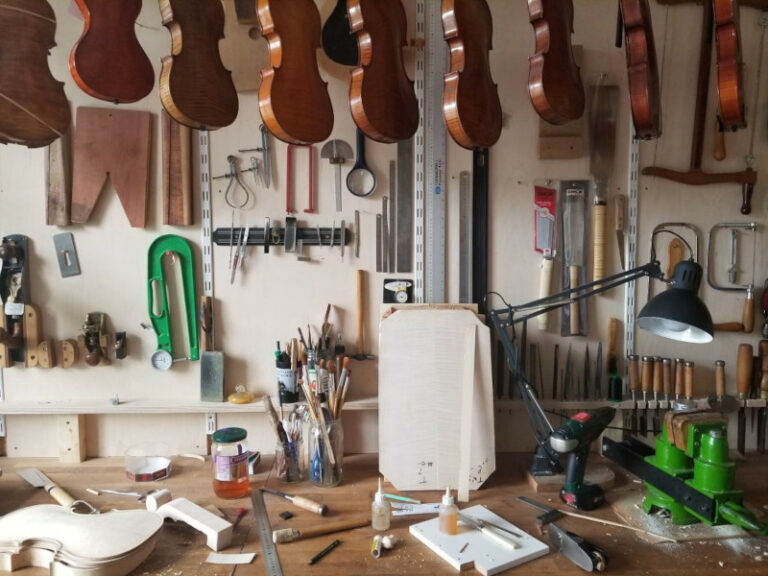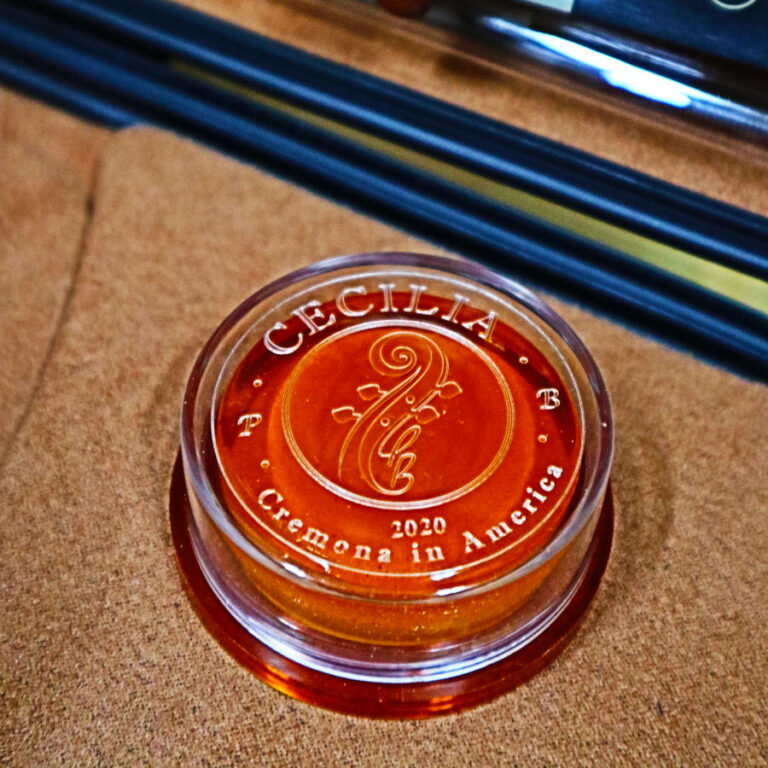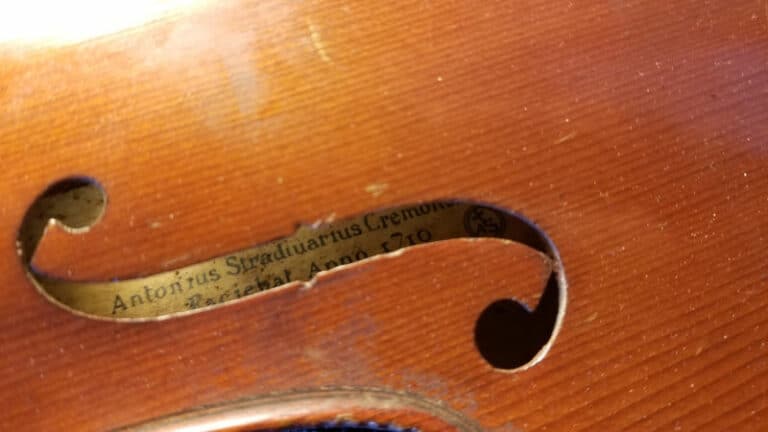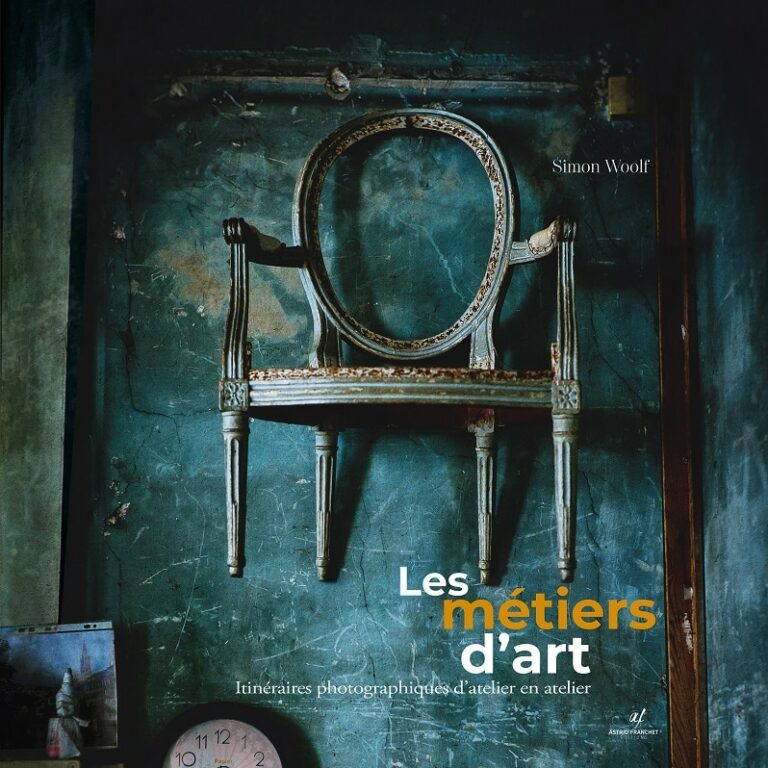Do you think that a good luthier is a bad musician? Personally, I think that if he were that good, he'd be on stage and not in a workshop. But today's topic is absolutely not about criticizing the profession. In fact, if I feel like writing about it, it's because of all the messages I receive from you about the lutherie profession. Some of you seem to think that you need a gold medal from the conservatory or to have played the instrument you want to work on to be credible. Let me tell you what I think.

Why is the good luthier a bad musician?
Pour commencer, il faut que je vous parle de ce que j’entends par le mot « luthier ». À chaque fois que je vais employer ce mot ici, il sera question de la profession qui est exercée afin de pouvoir en vivre. Donc vraiment la personne qui dédie sa vie à cet art. Et il en est de même pour les musiciens. Il n’y a évidemment aucun mal à pratiquer ces activités à titre de hobby.
A question of mathematics
In fact, it's quite simple: it's just a question of mathematics. Each discipline requires an investment of time and money, and the parallels between lutherie and music are obvious. First of all, you have to train, and for that you have to equip yourself:
- For the musician, it's an instrument and the accessories needed to learn.
- A luthier will need his own tools and materials.
To perfect his art, each of them will join a school, follow the teaching of masters and spend countless hours improving his gesture. In fact, the 10,000-hour rule is often used to express the scale of magnitude with which we are confronted. What's more, in both cases, the tools needed to practice will be very expensive.
[pullquote align= »center »]
10,000 hours of practice represent 10 years of work at 20 hours a week, or 5 years full-time.
[/pullquote]
The limits of the human being
In fact, unless you're a superhuman genius, it's pretty hard to excel in more than one discipline. I'm not saying it's impossible, but it will undoubtedly require enormous sacrifices. Especially as the highest places on the podium are inaccessible to the vast majority.
D’ailleurs, je vais vous donner quelques chiffres assez parlant. Savez-vous à quel âge le célèbre Antonio Stradivari a produit ses plus beaux instruments ? En fait, durant la période que l’on considère comme son « Âge d’Or » et qui s’acheva en 1720, il avait entre 66 et 77 ans. C’est un âge extrêmement avancé, mais qui témoigne d’une grande maîtrise du sujet. D’ailleurs, il est vraisemblable que ce soient ses fils qui réalisèrent alors la majorité du travail.
Then, to take Ray Chen's example, he calculates in this article how many hours of annual practice he has accumulated over the course of his life. This is, of course, his practice work outside classes, rehearsals and other professional occupations.
The good luthier is a bad musician, but that's not a bad thing.
In fact, when a musician enters a lutherie workshop, it's not to listen to music. He's there to benefit from the knowledge and know-how he hasn't been able to accumulate because he's been too busy practicing and mastering his own subject. That's why trying to impress him with your instrumental technique would be quite inappropriate. If you can do the job you're asked to do at a very good level, that's more than enough.

Why I decided not to be a musician
Of course, I'm going to talk about my own experience, which I consider typical. In fact, I too wanted to be a musician in a life that seems so far away. I spent countless hours working on an instrument, rehearsing, setting up projects, performing on stage, travelling... In fact, for a while I even thought I could combine my two passions and live happily ever after. But at a certain point, one took precedence over the other, it was inevitable. As luck would have it, that's when my life began to change and led me to where I am today...
If I can make a living from my work today, it's because I devote myself to it. In other words, it's an integral part of my life, invasive, obsessive, and I can't get away from it. Besides, even if it's obvious that I'm a bad musician, I wouldn't go so far as to say that I'm a good luthier, but I do my best. And that's probably the most important thing.
A special case
I know a special case: Clémentine. She's a young luthier and musician I met several years ago. We've had several opportunities to work together, and she's doing pretty well in the workshop. She's asked me several times what I think about wanting to be an artist in both lutherie and music. Of course, I don't think it's productive to divide your forces. Especially when you need results fast.
But who am I to tell you what to do? Whatever you do, don't let them tell you what you can and can't do.
That's why my ultimate advice is to do what you want.
[kad_youtube url= »https://www.youtube.com/watch?v=4ZoEkjAAjXI » width= »600″ height= »400″]
Do you have to play an instrument to be a luthier?
In fact, that's the question I want to answer today. Because for me, even if we more or less accept the fact that a good luthier is a bad musician, it's above all important to understand that a luthier fundamentally doesn't need to play the instrument he's working on. Of course, he has to study it, understand it and appreciate it, and that's always an asset. However, I think it's a real stretch to say that an excellent luthier must also be a musician. In fact, I know very few who really are, even if some are quite advanced.
That's why I wanted to reassure any apprentice luthiers who aren't musicians. All you need is solid woodworking skills, patience and attention to detail. As for the rest, if you don't like music, I think you'd better move on, because you'll be constantly talking to people who have nothing else to do in life. Musicians are real geeks... But let me reassure you, so are luthiers, and have you ever found yourself in the middle of an argument about the firmness of a sanding block? It happens in the workshop.






